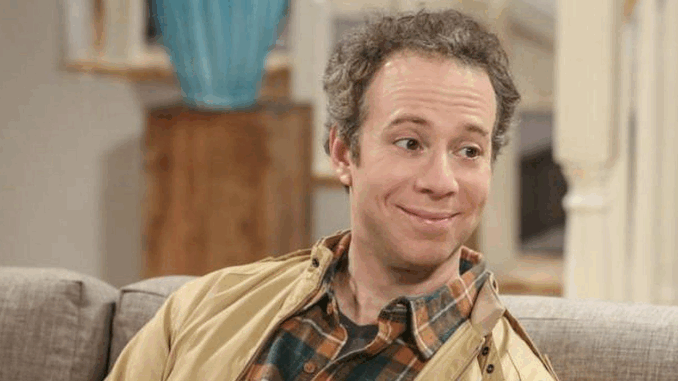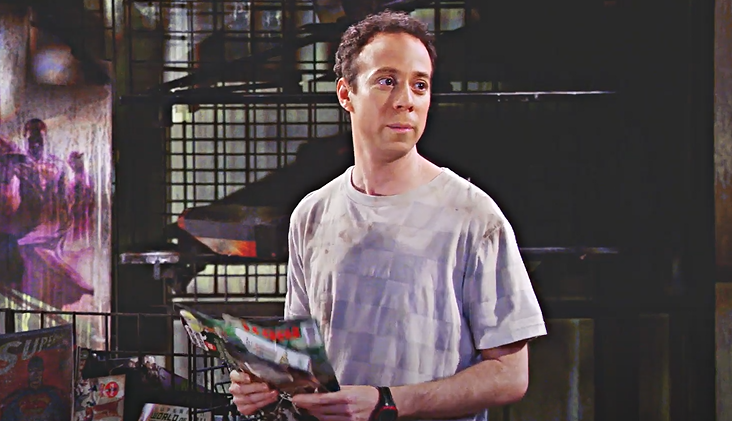
Among the many brilliant minds and colorful personalities that populated The Big Bang Theory, Stuart Bloom often stood quietly in the background—unassuming, awkward, and frequently unlucky. Yet by the time the series wrapped, this once-side character had earned a surprising amount of love from fans. Stuart wasn’t just the comic book store owner; he was a subtle reflection of loneliness, resilience, and quiet growth.
When Stuart was first introduced, he was simply a quirky shopkeeper running the local comic book store where the guys hung out. At first, he was positioned as competition for Penny’s affection—an unlikely love rival to Leonard. But rather than becoming a central part of the romantic storyline, Stuart slowly evolved into something more poignant. He became the show’s most relatable figure: the outsider looking in.
Stuart never had the degrees, the research grants, or the scientific accolades of the others. He wasn’t a genius, and he didn’t try to be. He was an artist, a comic nerd, and a business owner struggling to make ends meet. His financial hardships, string of failed relationships, and increasingly dire living situations were often played for laughs. But beneath the surface, Stuart carried an emotional weight that few characters on the show ever had to bear.
What made Stuart resonate with viewers was how his misfortunes never hardened him. He remained kind, soft-spoken, and surprisingly optimistic—even when things were at their worst. Whether he was crashing on Howard and Bernadette’s couch, trying desperately to find love on dating apps, or repainting his store to feel “less depressing,” Stuart embodied perseverance in its quietest form.
In later seasons, Stuart’s role expanded as he became more integrated into the group. He wasn’t just the guy running the comic shop anymore—he was babysitting Howard and Bernadette’s kids, getting invited to parties, and even starting to find love again. His romance with Denise, the confident and equally nerdy assistant he hires at the store, gave fans a rare win for Stuart. It was a relationship that felt natural, funny, and well-earned.
While characters like Sheldon and Leonard took center stage with big emotional arcs and romantic drama, Stuart’s development happened in the margins. He didn’t have dramatic confrontations or tearful revelations. His growth was quieter—learning to value himself, finding small moments of happiness, and slowly becoming part of a community he once felt excluded from.

Stuart’s friendship with the group wasn’t always smooth. He often felt like a last-minute invite or the backup friend when someone else wasn’t available. But over time, the others began to genuinely appreciate him. His loyalty, honesty, and self-deprecating humor made him a grounding presence in a show full of egos and eccentricities.
What’s perhaps most impressive is how the writers never turned Stuart into a caricature. Despite his misfortunes, he never became a punchline devoid of depth. Kevin Sussman’s nuanced performance gave Stuart the vulnerability and awkwardness that made him endearing, not pathetic. He brought heart to the role, often stealing scenes with just a few lines or a perfectly timed glance.
In many ways, Stuart was the emotional underdog of The Big Bang Theory. While the other characters celebrated Nobel prizes, weddings, and babies, Stuart’s victories were smaller but just as meaningful—finding love, reopening his store, and finally feeling like he belonged.
By the series finale, Stuart may not have been standing on the big stage, but he didn’t need to. He had carved out a quiet, fulfilling life for himself, and in doing so, became one of the show’s most authentic success stories.
Stuart Bloom is proof that not all heroes wear lab coats or quote string theory. Some run comic book stores, wear ill-fitting cardigans, and show up day after day with kindness, humility, and a little bit of hope. And that, in its own way, is truly heroic.